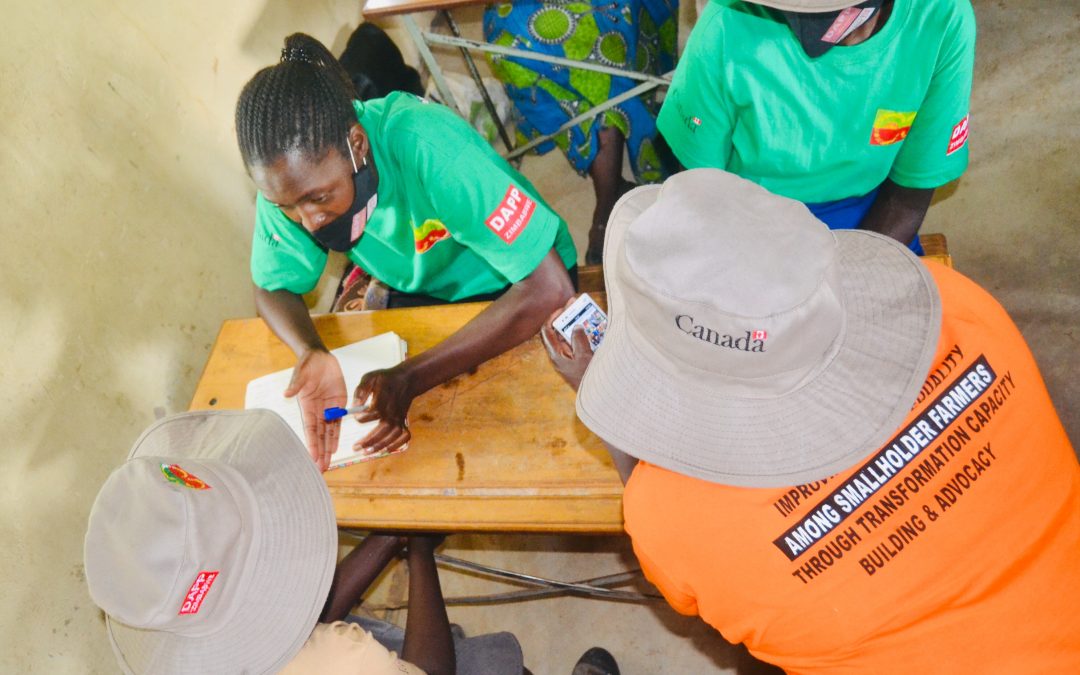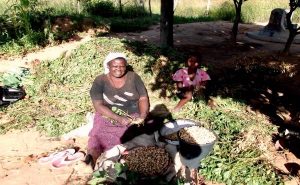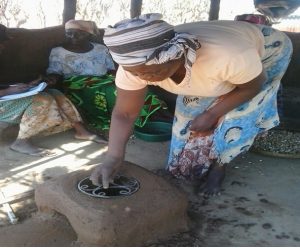
by dapp | Mar 1, 2021 | Blog, News
Small holder women farmers have struggled to access markets for their produce , a situation that have left them with stunted growth in the sector.
DAPP Zimbabwe with support from Canada Funds for local initiatives conducted a 2 day digital marketing training exercise for women farmers at Siyalima Farm in Guruve.
The training was centered around how they can effectively use their mobile devices to increase their market reach, strengthen linkages and earn more from their crops.
Beneficiaries says the training at the opportune time when online trading is the only option due to the nationwide Covid -19 lockdown
“Due to the current prevailing Covid-19 lockdown its been very difficult to go to the market as usual so this training on sell using phones from the comfort of our homes will open new markets to us and we can do it from home” Stella Chatambudzika
The project officer at Siyalima Paul Majongwe said though most of the beneficiaries face several challenges from cultural, social factor , time this type of training has made a significant impact and has broken down barriers and is allowing both women and men to engage and unlock the benefits of online platforms. “Our goal is to encourage these small scale farmers to look beyond their community to seek out better markets and pricing for their produce through the use of these technologies”
” It is critical that our focus remains on gender mainstreaming and inclusivity hence we ensured that the training encouraged full participation from both men and women in an effort to fight poverty and increase agricultural production, access to markets, raise family income for the development.” said Majongwe


by dapp | May 23, 2019 | Blog, News
Green leafy vegetables provide essential vitamins and minerals that are important for a healthy diet. Garden Farming in Makoni has been doing just that. Families involved in the GAIA funded Farmers’ clubs program have been able to address food insecurity and improve the health of families by tackling malnutrition. Throughout the year families that established nutrition gardens have increased their resilience and prevented malnutrition .
Grace Mupoperi , a member of the Mabvazuva garden group has seen the benefits of nutrition gardens on the health of her 6 children “Gardens are a source of nutritious food for my children. I see that they don’t fall sick as often as they used to before I had my own garden. We grow different varieties of vegetables that even give us income as we sell them to others in the community ”
Farmers in the project organised themselves into 24 groups and they join their forces, ideas and resources so that they can further the agricultural production of each member. Families make use of seed sharing and organic manures which produce quality vegetable varieties. This coupled with adopting best farming practices methods such as crop diversification, compost making, mulching and crop rotation farmers are giving their families the much needed nutritional diversity.
Gardening farming not only contributes to household food security but it is also providing extra family income from the sale of surplus produce to the local community. Families with gardens usually produce more than enough for their families and the rest is sold and the income is used for medical expenses, school fees, savings and other home improvements requirements.
The Farmers club program funded by Gaia Movement aims to enhance 1 200 farmers’ resilience to current and future climate related shocks and protect the environment in Makoni district thereby making them food, nutrition and income secure all year round. This organised Farmers’ Clubs allow them to be better prepared against current and future climate change related shocks

Bumper garden produce for the family

by dapp | May 17, 2019 | Blog, News
Mirriam Kwambana 47 lives in Mutasa district with her family. Like many rural families she used an open fire for her daily cooking activities. The process was both time consuming and had negative effects on her and her family’s respiratory health. After learning the benefits of firewood saving stoves from the Farmers’ Clubs Sustainable Lifestyle and Education program she decided to construct one for her home and has cut down her meal preparation time while using less firewood.
“Before having this firewood saving stove, I used to walk long distances to look for firewood and then endure hours of breathing smoke from the open fire which results in persistent coughing.
Mirriam is one of the 1000 Farmers’ clubs members who were part of the 10-Year Framework of Programmes on Sustainable Consumption and Production (10YFP) which aims to accelerate the shift towards sustainable consumption and production in both developed and developing countries.
Through this program Mirriam and many in her community are actively taking steps to turn the tide on global warming through construction of firewood saving stoves and planting more trees in their communities.
These small steps have had positive environmental impacts such as reducing the number and frequency of trees being cut down for cooking purposes. Because the firewood saving stoves use less wood and emit less smoke this reduces the amount of greenhouse gases released in the air









